On August 22, in order to thoroughly implement the deployment requirements of the National Standardization Development Outline, continue to improve the emerging industry standard system, forward-looking layout of future industrial standard research, give full play to the industry guiding role of standards, and promote the high-quality development of new industries, the Ministry of Industry and Information Technology, the Ministry of Science and Technology, the National Energy Administration, and the State Administration The Home Standards Committee issued the "Implementation Plan of the New Industry Standardization Pilot Project (2023-2035)" (hereinafter referred to as the "Implementation Plan"). The implementation plan mainly focuses on the standardization of emerging industries and future industries, forming "8+9" key areas of new industrial standardization, including the new generation of information technology, new energy, civil aviation and other fields. In terms of civil aviation, including the development of aircraft standards such as commercial aircraft, amphibious aircraft, helicopters, drones, new power and new configuration aircraft; the development of engine standards for whole aircraft, key important components, airworthiness, customer service, etc.; the development of avionics systems, flight control systems and electromechanical systems. Load system standards. Develop basic products, full life cycle data, production and manufacturing and other aviation common basic standards, as well as operation support standards...
Develop aircraft standards for commercial aircraft, amphibious aircraft, helicopters, drones, new power, new configuration aircraft and other aircraft standards. Develop engine standards such as the whole machine, key and important components, airworthiness, customer service, etc. Develop airborne system standards such as avionics systems, flight control systems and electromechanical systems. Develop basic products, full life cycle data, production and manufacturing and other aviation common basic standards, as well as operation support standards. Aircraft. Develop design standards for commercial aircraft flight integration, noise reduction and drag reduction, full machine fire prevention, as well as modular development, digital prototype, man-machine efficiency simulation verification, system layout, weight control and other standards. Develop standards for amphibious aircraft, aerodynamics, wading structures, water loads, water tests and test flights, and water support. We have developed standards such as rotor aircraft ball flexible rotor system, high-performance transmission system with large load, bearingless tail rotor, rotor anti-icing device, etc. Develop UAV systems, platforms, data chains, ground control station standards, as well as cluster UAVs, networked UAVs, intelligent UAVs and other standards. Develop new power standards such as electric, hybrid and hydrogen energy, as well as new configuration standards for variant aircraft and multi-rotor aircraft. The engine. Develop the seamability standards of the turboshaft engine, the large culvert ratio turbofan engine, and the key important components and systems. Develop civil aviation engine delivery data, random data, maintenance/mair and other engine customer service standards. On-board system. Develop avionics system standards such as civil aircraft communication navigation software, hardware, data, anti-collision alarm equipment, automatic testing of airborne products, flight control electronic, kinetic, hydraulic control, flight control and other flight control system standards, as well as electromechanical system standards such as electric power, hydraulic, fuel, environmental control, oxygen, landing gear, etc. General foundation and operational support. Develop basic product standards such as civil machine materials, standard parts and special components, product data standards for civil machine product design, manufacturing, installation, delivery, service and other stages, advanced forming technology, composite materials and component manufacturing, flexible assembly and other manufacturing standards. Develop operational support standards such as flight operation engineering, aircraft operation safety, operation engineering, maintenance engineering, training engineering and technical publications.















